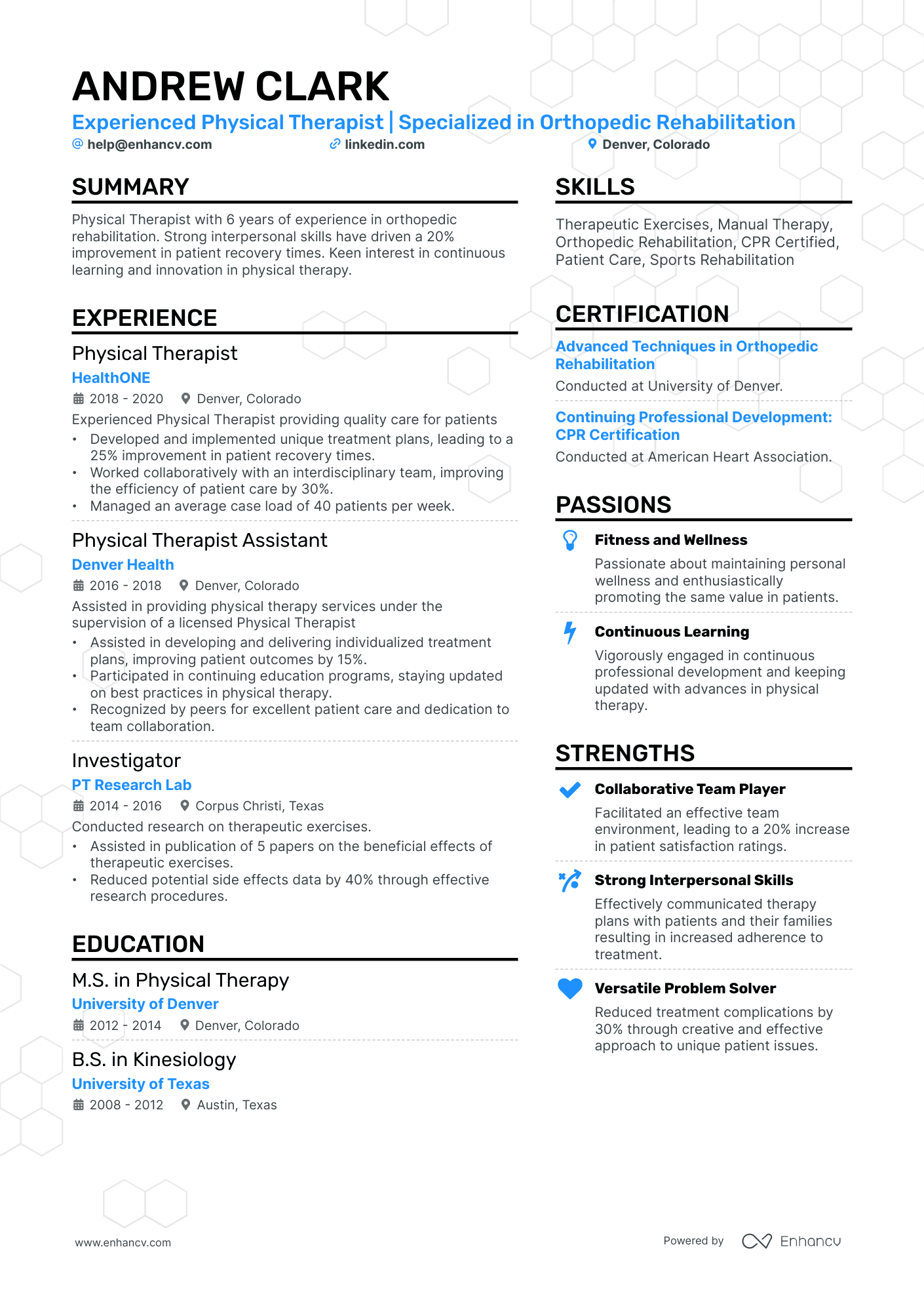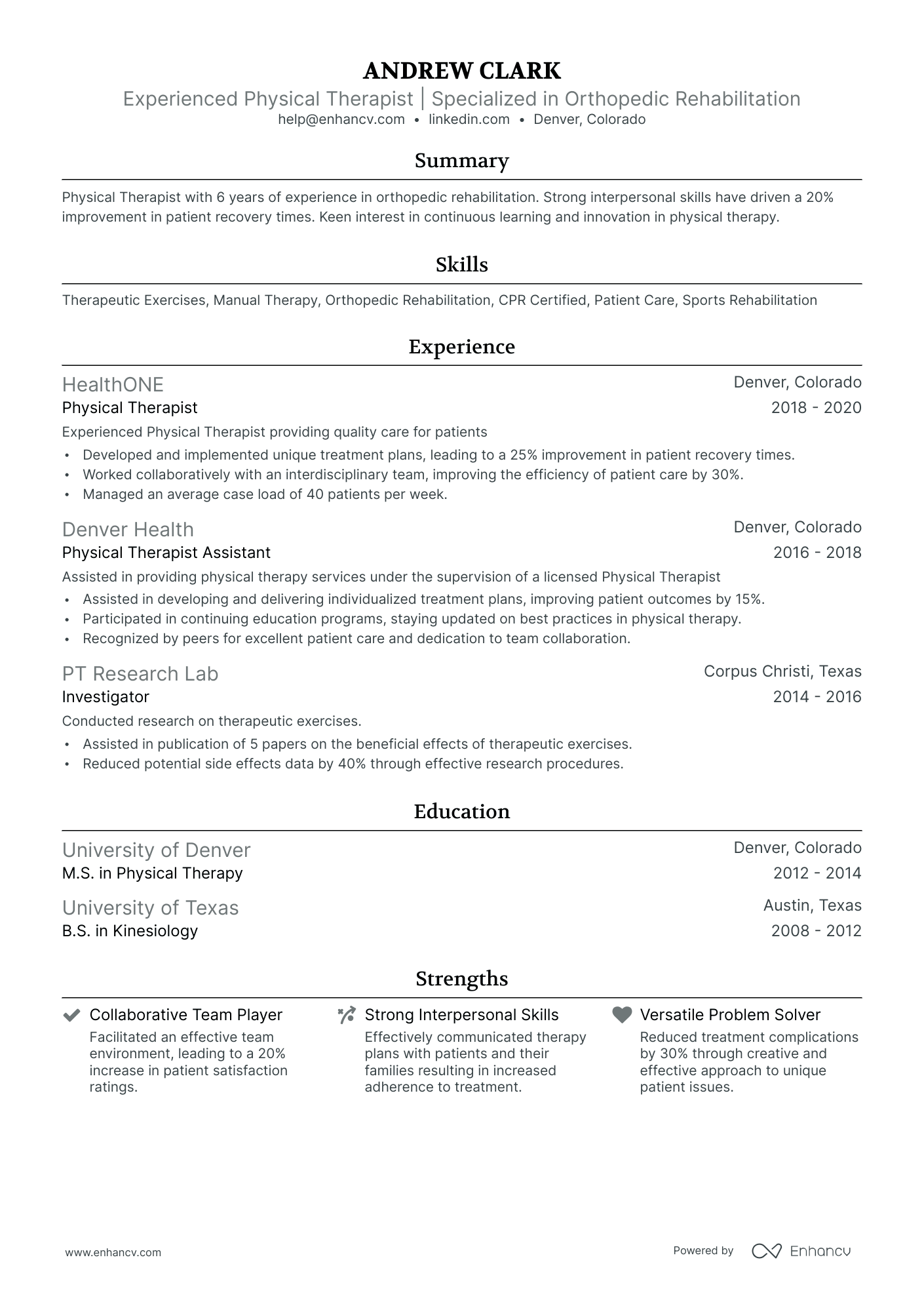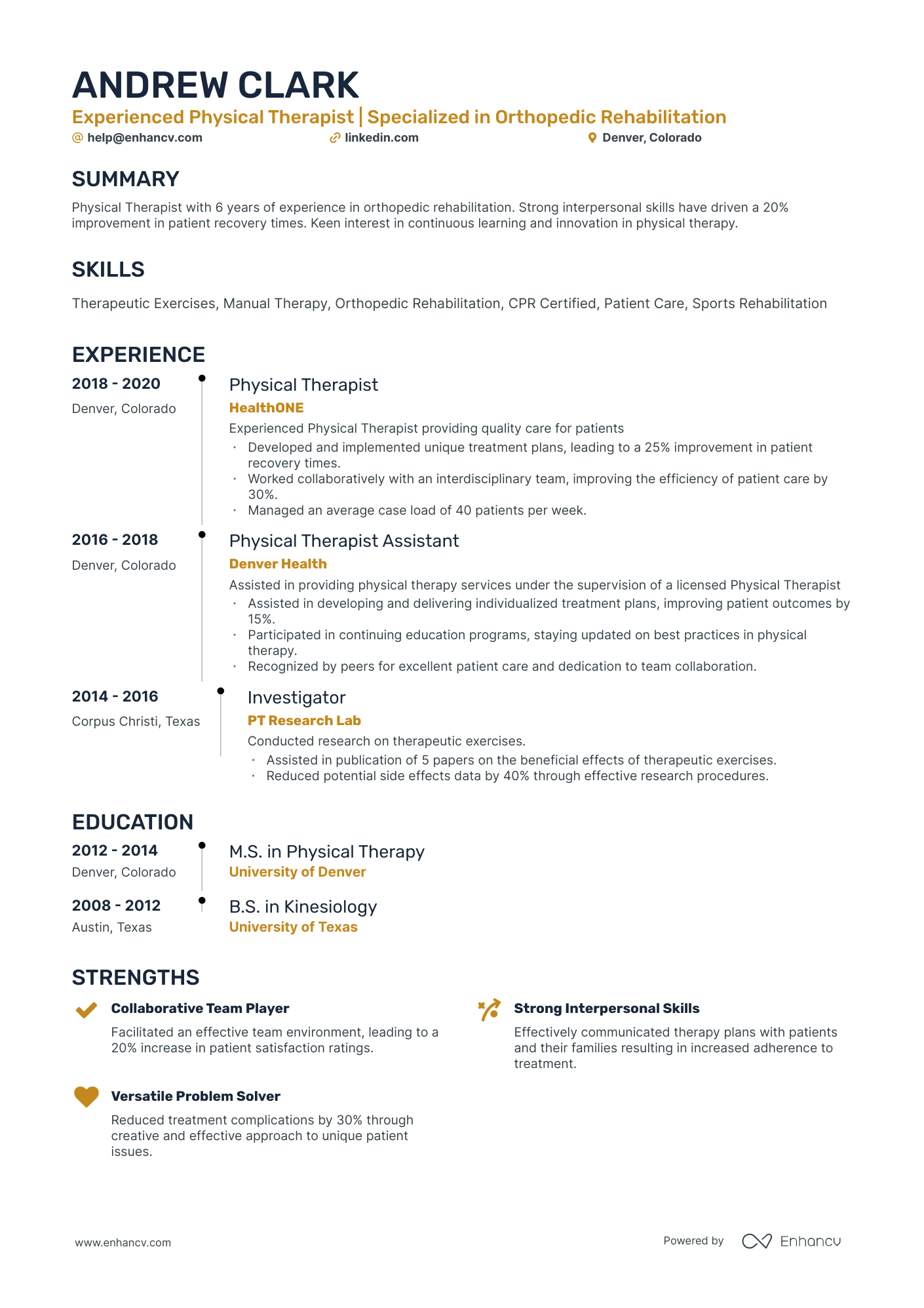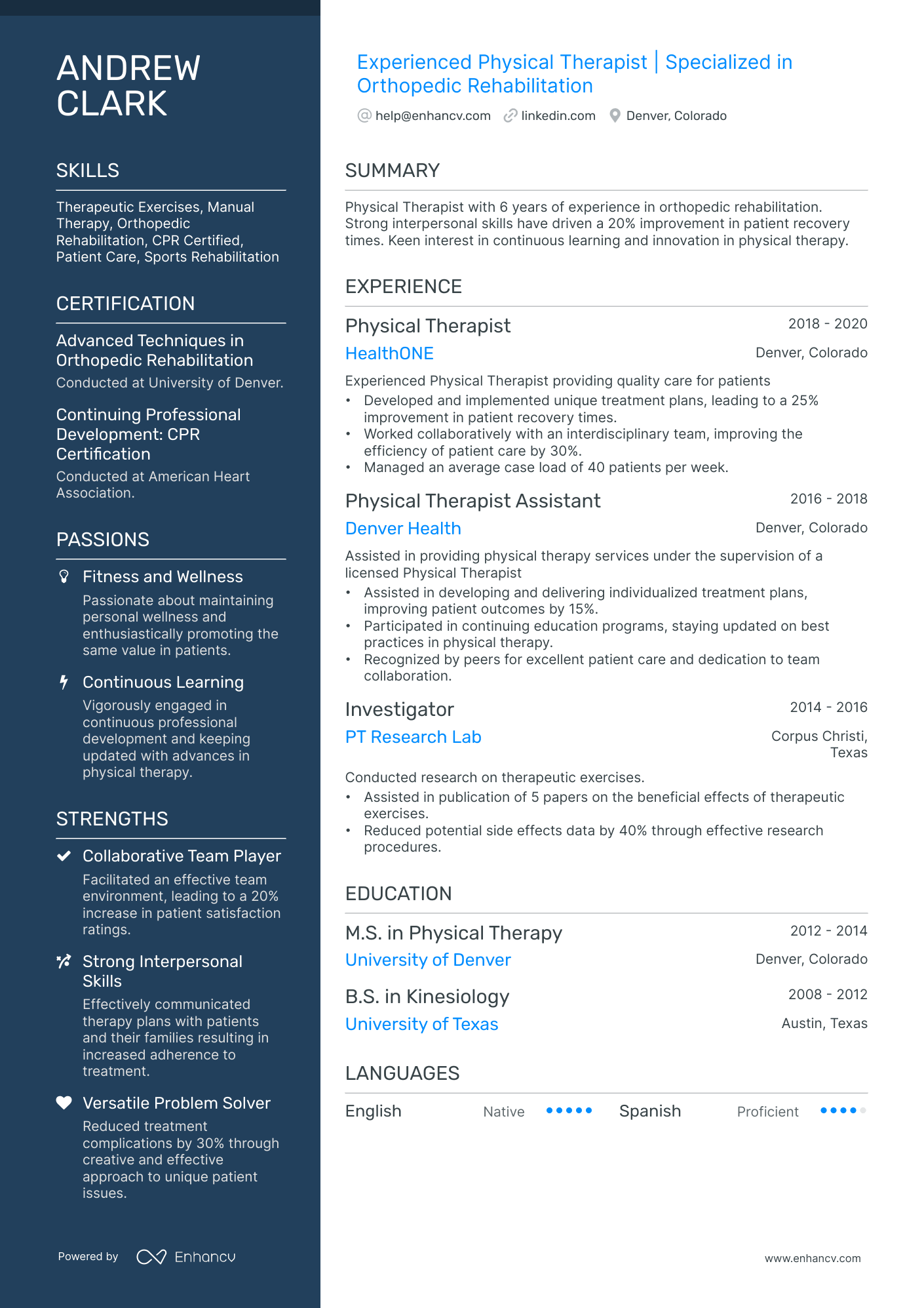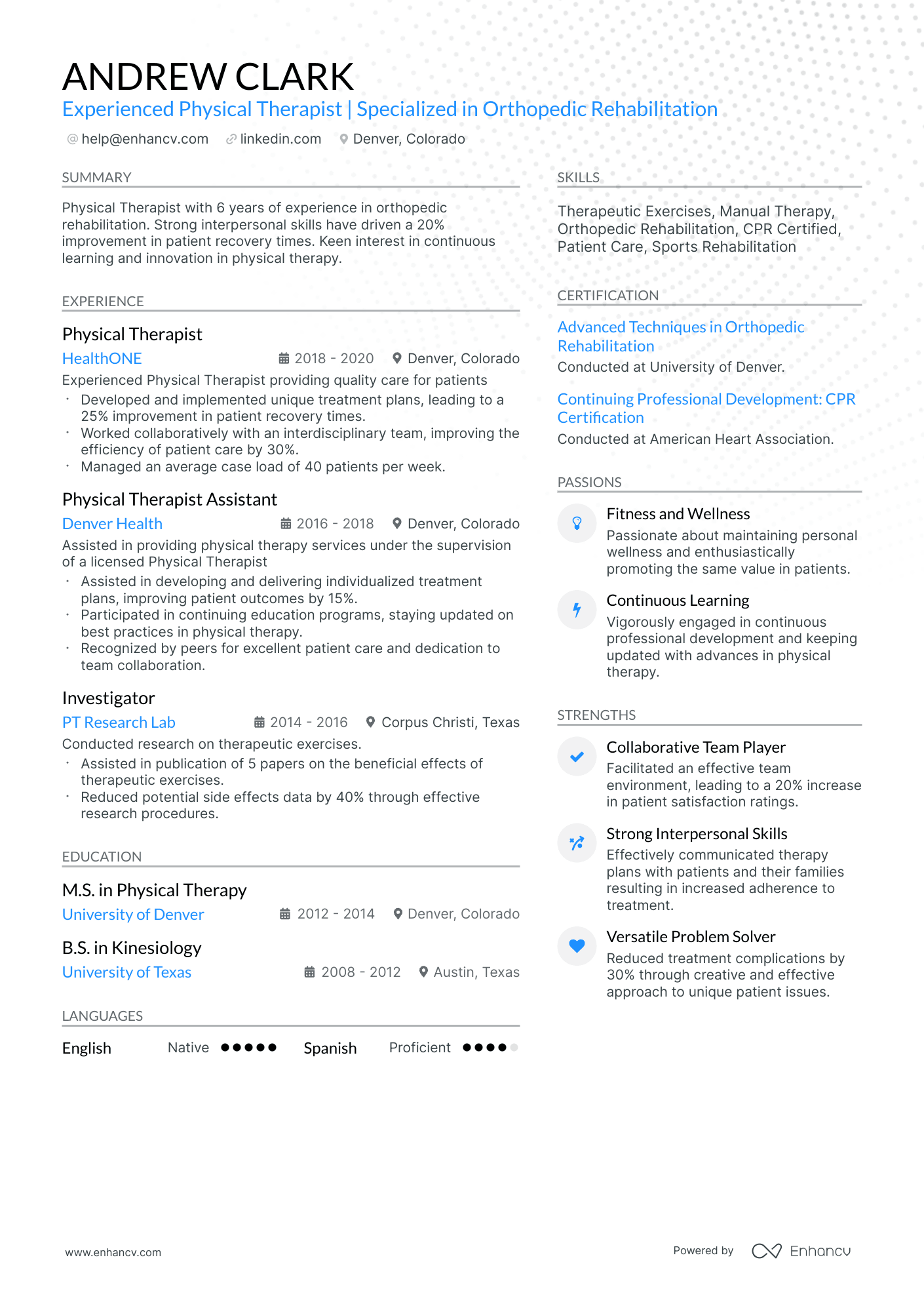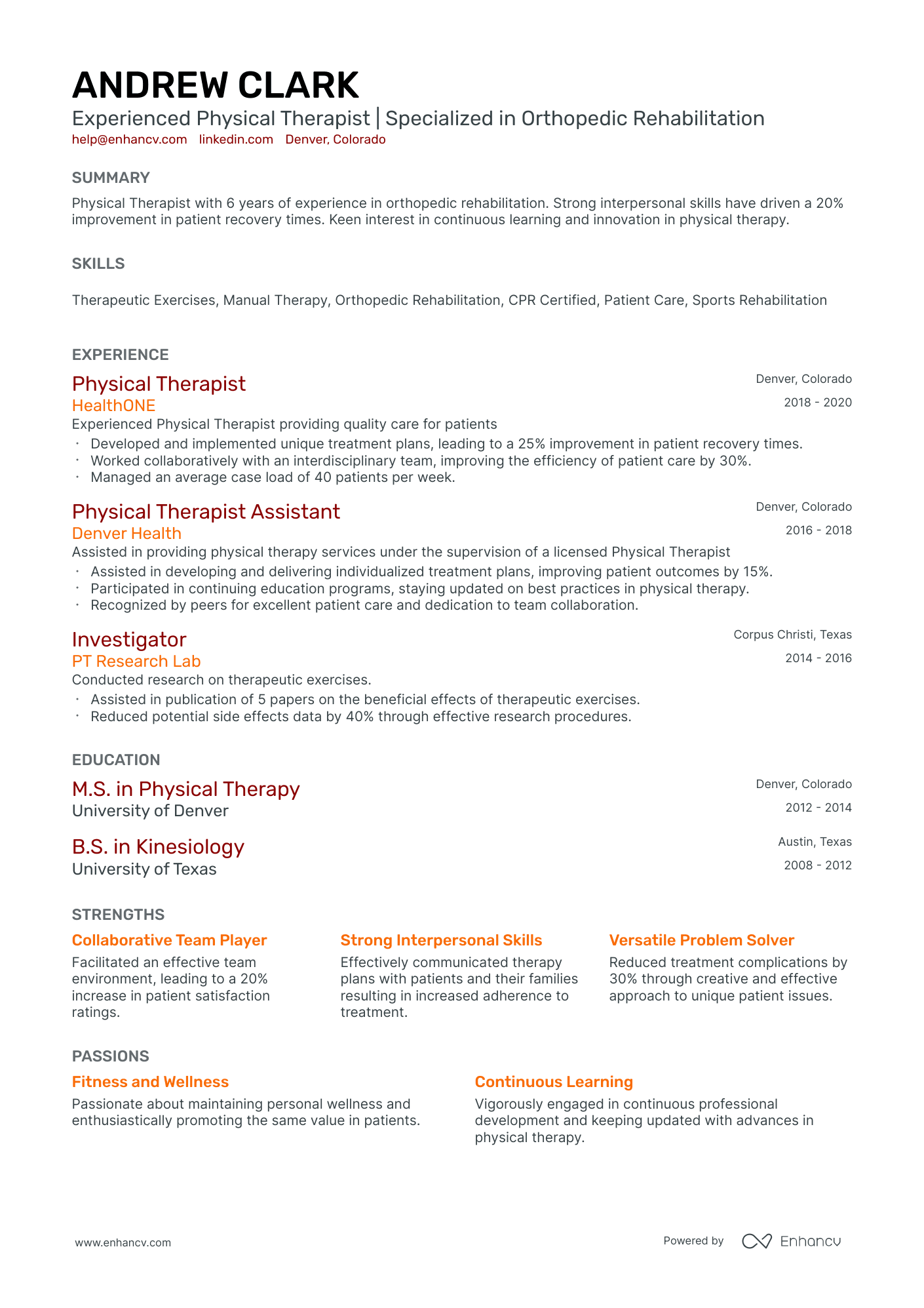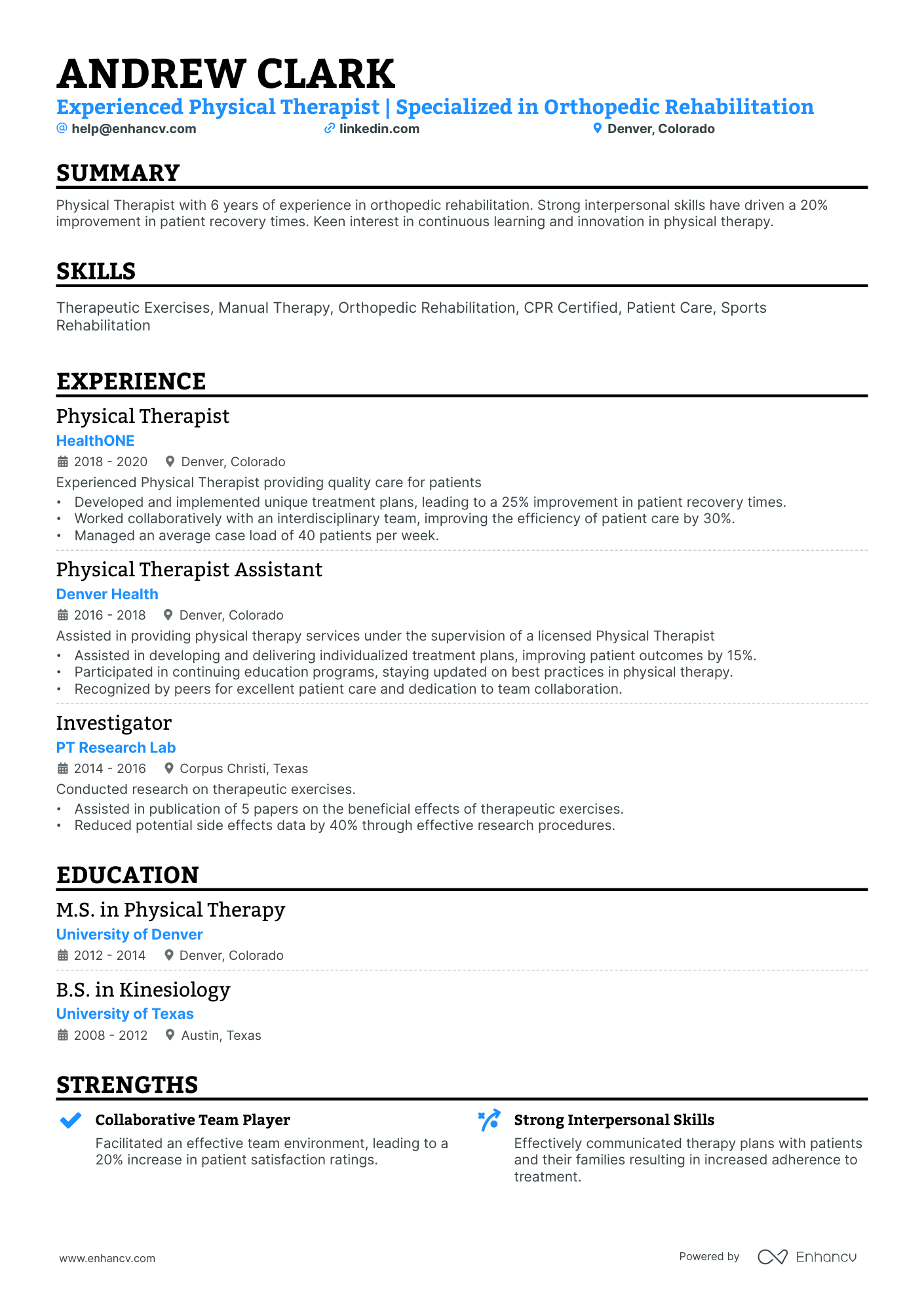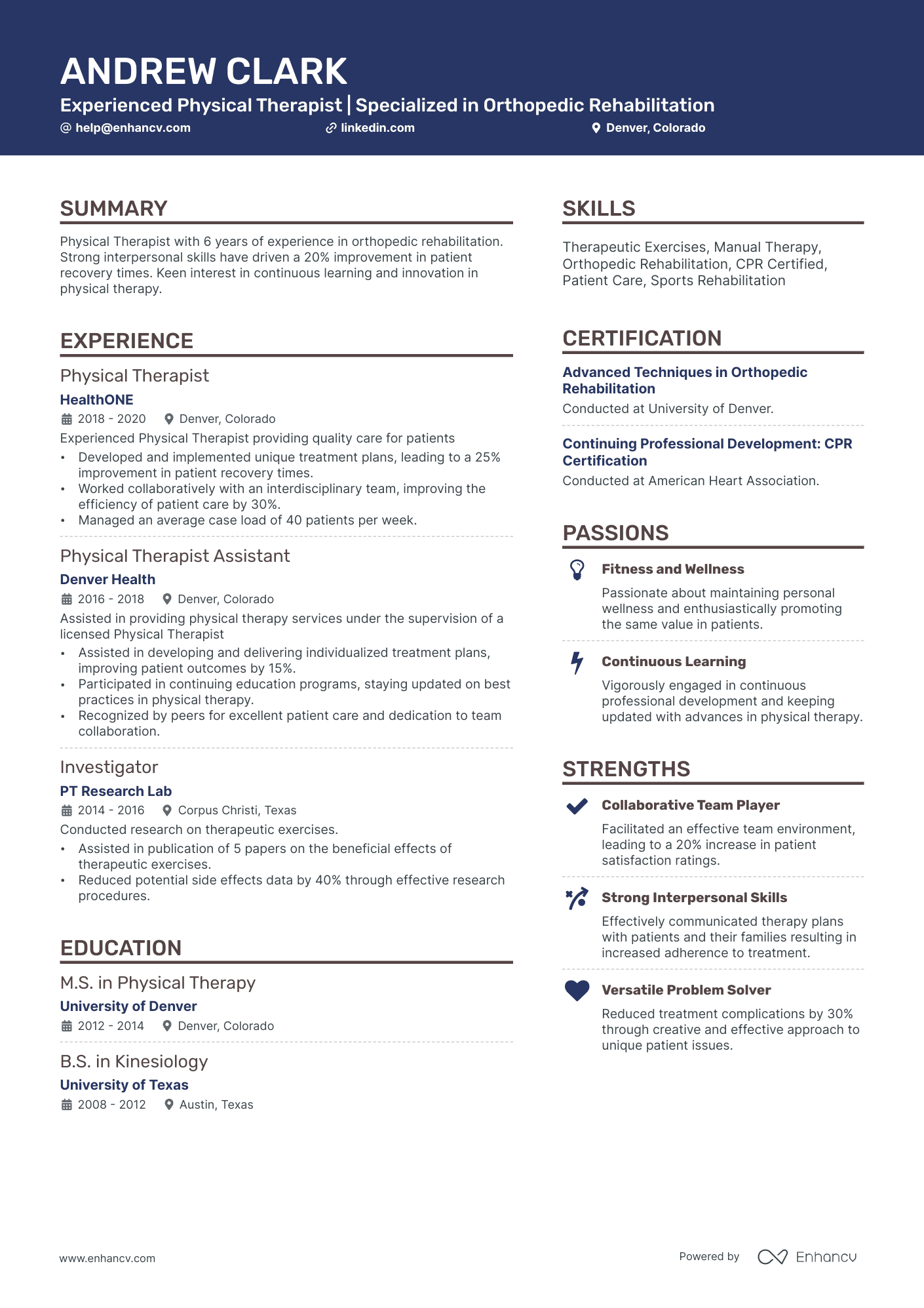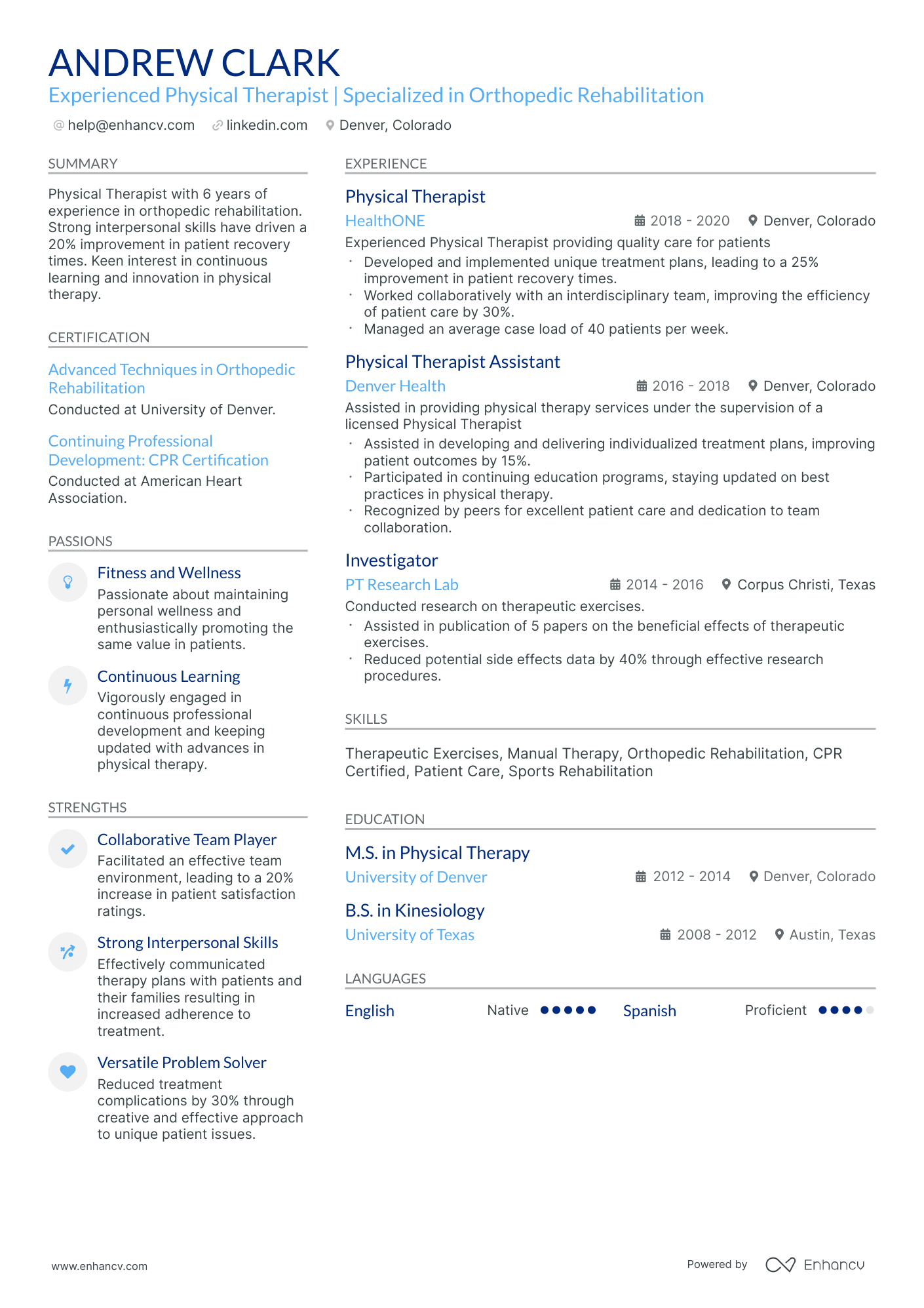Physical therapist assistants often struggle with effectively showcasing their hands-on experience and unique patient care skills on their resumes. Our guide can assist by providing specific examples and templates that highlight relevant skill sets and experiences, demonstrating how to present them compellingly to potential employers.
Dive into this guide to uncover:
- Top-tier physical therapist assistant resume samples that have successfully landed candidates in leading companies.
- Strategies to direct recruiters' focus towards your standout experiences, notable achievements, and pivotal skills.
- Guidance on crafting resume sections that align closely with the vast majority of job specifications.
- Insights on harmonizing your physical therapist assistant technical prowess with your distinct personality, setting you apart from the competition.
Recommended reads:
Formatting the layout of your physical therapist assistant resume: design, length, and more
When it comes to the format of your physical therapist assistant resume , you've plenty of opportunities to get creative. But, as a general rule of thumb, there are four simple steps you could integrate into your resume layout.
- If you have plenty of experience, you'd like to showcase, invest in the reverse-chronological resume format. This format focuses on your latest experience items and skills you've learned during your relevant (and recent) jobs.
- Don't go over the two-page limit, when creating your professional physical therapist assistant resume. Curate within it mainly experience and skills that are relevant to the job.
- Make sure your physical therapist assistant resume header includes all of your valid contact information. You could also opt to display your professional portfolio or LinkedIn profile.
- Submit or send out your physical therapist assistant resume as a PDF, so you won't lose its layout and design.
The layout of a resume can differ by region – Canadian resumes may use a distinct format.
Upload your resume
Drop your resume here or choose a file. PDF & DOCX only. Max 2MB file size.
Pro tip
If you don't happen to have that much relevant experience for the role, you could select a different format for your resume. Popular choices include:
- functional skill-based resume format - that puts the main focus on your skills and accomplishments;
- hybrid resume format - to get the best of both worlds with your physical therapist assistant experience and skills.
Essential physical therapist assistant resume sections for a comprehensive overview:
- Header: Enables recruiters to swiftly access your contact details and peruse your latest work portfolio.
- Summary or Objective: Offers a snapshot of your career milestones and aspirations.
- Experience: Demonstrates alignment with job prerequisites and highlights your tangible contributions.
- Skills: Captures the full spectrum of your expertise, making you a compelling physical therapist assistant candidate.
- Education & Certifications: Bridges potential experience gaps and underscores your dedication to the field.
What recruiters want to see on your resume:
- Certification and Licensing: Indicate any physical therapy certifications or licenses you hold, such as a physical therapist assistant license. Each state has different requirements for PTAs, so including this information can prove your eligibility to work.
- Experience in Patient Care: Detail your experience working with patients, particularly if you've worked with diverse populations (e.g., children, seniors, athletes).
- Technical Skills: Highlight your ability to use therapeutic equipment and software commonly used in the field of physical therapy.
- Communication Skills: As a PTA, excellent communication skills are necessary for interacting with patients, their families, and the rest of the health care team. Evidence of strong interpersonal skills on your resume can be highly appealing to recruiters.
- Continuing Education: Showcasing ongoing professional development and learning in the field of physical therapy, such as participation in seminars, workshops, or advanced courses, can set you apart from other candidates.
Recommended reads:
Strategies for crafting your physical therapist assistant resume experience section
When detailing your physical therapist assistant resume experience, it's essential to pair responsibilities with tangible achievements.
Consider including:
- Key responsibilities, emphasizing their significance to your role, team, or organization.
- Experiences that have fostered your technical acumen or professional growth.
- Metrics that underscore your contributions and successes.
- Challenges you've addressed and the solutions you've implemented.
- Strategies you've devised and their measurable impact on growth.
Your experience section is pivotal in making a lasting impression on recruiters. To inspire you, we've curated real-world physical therapist assistant examples:
- Provided physical therapy treatments to patients under the supervision of a licensed therapist.
- Assisted in developing personalized treatment plans for patients with musculoskeletal injuries.
- Conducted therapeutic exercises and modalities to improve patients' range of motion and strength.
- Educated patients on proper body mechanics and home exercise programs for continued improvement.
- Collaborated with the healthcare team to ensure effective patient care and achieve optimal outcomes.
- Administered therapeutic interventions, including manual therapy and electrical stimulation.
- Managed a caseload of diverse patients with conditions such as orthopedic and neurological disorders.
- Assisted in conducting patient evaluations and progress assessments to track treatment effectiveness.
- Coordinated with other healthcare professionals to develop comprehensive treatment plans.
- Provided education to patients and their families on injury prevention and self-care techniques.
- Implemented therapeutic exercises and activities to help patients regain functional independence.
- Utilized specialized equipment and modalities, such as ultrasound and traction, for pain management.
- Assisted in the application of therapeutic taping techniques for joint stabilization and support.
- Collaborated with therapists in designing customized treatment plans based on individual needs.
- Documented patient progress and communicated findings to the supervising physical therapist.
- Provided post-operative rehabilitation for patients recovering from orthopedic surgeries.
- Assisted in developing specialized therapy programs tailored to each patient's surgical procedure.
- Instructed patients in therapeutic exercises and functional activities to promote healing and recovery.
- Collaborated with surgeons to implement evidence-based protocols for optimal surgical outcomes.
- Managed multiple patient cases concurrently while maintaining a high level of care and efficiency.
- Perform comprehensive assessments of patients' mobility, strength, and functional limitations.
- Administer therapeutic interventions, including joint mobilization and soft tissue techniques.
- Develop personalized treatment plans based on evaluation findings and individual goals.
- Educate patients on proper body mechanics, ergonomics, and lifestyle modifications.
- Collaborate with interdisciplinary teams to optimize patient care and facilitate positive outcomes.
- Assisted in implementing aquatic therapy programs for patients with various musculoskeletal conditions.
- Applied therapeutic techniques in a pool setting to improve patients' range of motion and endurance.
- Designed customized exercise routines for individuals utilizing the benefits of water resistance.
- Collaborated with aquatic therapy specialists to address patients' specific needs and goals.
- Maintained accurate documentation of patients' progress and treatment outcomes.
- Assisted physical therapists during patient evaluations and assessments.
- Implemented therapeutic exercises and activities to improve patients' strength and endurance.
- Utilized therapeutic modalities, such as heat and cold packs, to relieve pain and reduce inflammation.
- Provided guidance and education to patients on proper body mechanics and injury prevention.
- Collaborated with the healthcare team to ensure coordinated and effective delivery of care.
- Assisted in the implementation of therapeutic exercises and functional activities for pediatric patients.
- Provided support and encouragement to children during therapy sessions to maximize engagement.
- Collaborated with occupational and speech therapists to address comprehensive patient needs.
- Supported families in understanding and implementing home exercise programs for consistent progress.
- Recorded and maintained accurate documentation of patients' treatment sessions and outcomes.
- Managed a caseload of elderly patients with various age-related conditions and mobility limitations.
- Administered therapeutic exercises and gait training to improve balance and prevent falls.
- Implemented modalities like ultrasound and electrical stimulation for pain relief and tissue healing.
- Collaborated with geriatric specialists to develop individualized care plans for optimal outcomes.
- Assisted patients in using assistive devices and adaptive equipment for enhanced independence.
- Managed a diverse caseload, including athletes, with sports-related injuries and orthopedic conditions.
- Created and implemented customized rehabilitation programs to restore athletic performance.
- Utilized manual therapy techniques to improve joint mobility and soft tissue flexibility.
- Collaborated with sports trainers and coaches to develop injury prevention strategies for athletes.
- Provided on-field assistance during sporting events to address acute injuries and support recovery.
Quantifying impact on your resume
<ul>
Crafting the experience section for novice physical therapist assistant candidates
Lack of extensive experience doesn't equate to an empty resume. Here's how you can enrich your experience section:
- Volunteer Roles: Community involvement often equips you with valuable interpersonal skills, and sometimes even technical ones, relevant to the job.
- Academic Projects: Highlight significant university projects that contributed to the field, showcasing your hands-on experience.
- Internships: Even short-term internships can be invaluable. If they're pertinent to the role, they deserve a spot on your resume.
- Past Jobs: Even if unrelated to the physical therapist assistant, these roles can demonstrate transferable skills that are beneficial for the position.
Recommended reads:
Pro tip
Highlight what sets your experience apart. Incorporate metrics, feedback, and the tangible value you've added to organizations. This specificity ensures your resume remains pertinent and memorable.
Decoding the essence of your physical therapist assistant resume: hard and soft skills
Every job description communicates the desired hard and soft skills. These skills are the backbone of your application.
Hard skills are your tangible, technical proficiencies, often validated through certifications or hands-on experience. On the other hand, soft skills reflect your interpersonal abilities and how you navigate diverse work environments.
To effectively spotlight these skills on your resume:
- Create a distinct section for technical skills, listing the most relevant ones for the job.
- Highlight your strengths by weaving in achievements that underscore specific skills.
- Strike a balance between hard and soft skills to present a well-rounded profile.
- If multilingual, include a language proficiency section, emphasizing the interpersonal advantages it brings.
Stay tuned for a deep dive into the most in-demand hard and soft skills in the industry.
Top skills for your physical therapist assistant resume:
Therapeutic modalities
Exercise equipment operation
Gait training devices
Electrotherapy machines
Ultrasound therapy
Manual therapy techniques
Patient assessment tools
Documentation software
Assistive devices knowledge
Rehabilitation protocols
Communication skills
Empathy
Teamwork
Time management
Problem-solving
Adaptability
Attention to detail
Interpersonal skills
Critical thinking
Motivational skills
Pro tip
When detailing your skills, align them with the job's requirements. Emphasize unique technical proficiencies and provide examples of your soft skills in action.
Highlighting your educational and certification milestones on your physical therapist assistant resume
While skills alignment is increasingly prioritized, your educational background and certifications still play a pivotal role in establishing credibility.
To effectively present your academic and certification achievements:
- Detail your educational journey, including the institution and duration.
- Highlight recent and relevant certifications, showcasing your commitment to continuous learning.
- Be concise; focus on the skills and knowledge gained rather than exhaustive details.
- If a certification is in progress, mention the expected completion date.
Remember, authenticity is key. If a certification is pending, be transparent about it.
Best certifications to list on your resume
- Physical therapist assistant (PTA) - American Physical Therapy Association
- Corrective Exercise Specialist (CES) - National Academy of Sports Medicine
- Certified Occupational Therapy Assistant (COTA) - American Occupational Therapy Association
- Associate's Degree in physical therapist assistant (ADPTA) - Commission on Accreditation in Physical Therapy Education
Pro tip
If you're in the process of obtaining your certificate or degree, list the expected date you're supposed to graduate or be certified.
Recommended reads:
Choosing the right physical therapist assistant resume summary or objective
The top section of your resume is pivotal. It should encapsulate your alignment with the job, your unique skill set, and your professional expertise.
Both the resume summary and resume objective can serve this purpose:
- Use the resume objective to spotlight your current achievements and future aspirations. Highlight how you envision your growth in the prospective role.
- Opt for the resume summary to succinctly present your most relevant professional highlights. Aim for brevity, ideally within five sentences.
Ultimately, these sections offer a glimpse into your professional persona and the unique value you bring.
Resume summary and objective examples for a physical therapist assistant resume
- Dynamic physical therapist assistant with 5+ years of experience in diverse rehabilitation settings. Dedicated to delivering customized patient-focused treatment plans and proficient in assisting with therapy sessions under the supervision of a licensed Physical Therapist. Notable accomplishments include significantly improving patients' mobility by 60% in previous roles.
- Adept Certified physical therapist assistant possessing 8 years of experience in outpatient clinics. Consistently demonstrated success in developing effective therapeutic exercise programs. Honored with the 'Outstanding Service' award for contributions to the improvement of patient wellness and recovery rates.
- Successful Business Analyst aspiring to leverage analytical skills, problem-solving abilities, and knowledge about human anatomy into a physical therapist assistant career. Proven record in streamlining processes and understanding people's needs, along with an academic background in health sciences. Ready to apply this unique blend of skills in a healthcare setting to enhance patient well-being.
- Experienced Nurse practitioner transitioning to a physical therapist assistant role. Bringing forth broad medical knowledge, excellent interpersonal skills, and a genuine passion for helping individuals recover from injuries or illnesses. Previously recognized for reducing hospital readmissions by 30% through comprehensive patient care.
- Eager to start a career as a physical therapist assistant, bringing forth a strong academic foundation from a Bachelor's degree in Kinesiology. Committed to applying learned principles of body mechanics, movement, and physical conditioning to aid patients' recovery journeys. Highly enthusiastic about putting theoretical knowledge into practice.
- An ambitious graduate seeking an entry-level physical therapist assistant role. Equipped with a strong educational background in Physiology, and ready to use theoretical knowledge for practical applications. Keen on providing excellent patient care and contributing positively towards their road to recovery.
Extra sections to include in your physical therapist assistant resume
What should you do if you happen to have some space left on your resume, and want to highlight other aspects of your profile that you deem are relevant to the role?
Add to your physical therapist assistant resume some of these personal and professional sections:
- Passions/Interests - to detail how you spend both your personal and professional time, invested in various hobbies;
- Awards - to present those niche accolades that make your experience unique;
- Publications - an excellent choice for professionals, who have just graduated from university or are used to a more academic setting;
- < a href="https://enhancv.com/blog/volunteering-on-resume/"> Volunteering - your footprint within your local (or national/ international) community.
Key takeaways
- Format your physical therapist assistant resume for clarity and coherence, ensuring it aligns with the role.
- Highlight key sections (header, summary/objective, experience, skills, certifications) within your physical therapist assistant resume.
- Quantify achievements and align them with skills and job requirements.
- Feature both technical and personal skills across your resume for a balanced portrayal.
